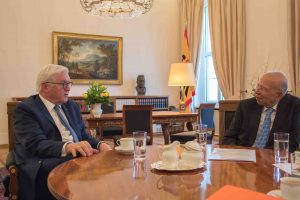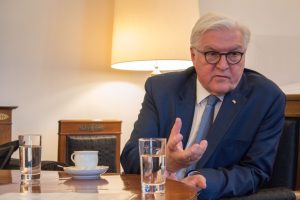“Only if Jews in Germany feel completely at home will our country be completely itself,” says Federal President Frank-Walter Steinmeier in an exclusive interview with the Jewish Voice. Steinmeier also voices his concerns about populism and the growing political polarisation in Germany. “However, I do not see an acute crisis that threatens the very survival of democracy in Germany”…

(c) JVG
How can the liberal democracies assert themselves in a lasting way against the global populist offensive?
We should first ask ourselves what is meant by populism and what causes it. Although populist movements around the world take many different forms and pursue many different goals, they have one thing in common – they all purport to be the voice of the so-called “real people” against the representative institutions of the state and political sphere. That is precisely what defines populism’s opposition to liberal democracy, where the people always exist in the plural and equality before the law governs peaceful coexistence. I think that the upheavals in the middle classes, particularly as a result of the impact of globalisation, are one of the things currently feeding populism and the fascination with authoritarianism.
The liberal democracies thus face particular challenges. What is vital here is that the full authority of the state protects human and civil rights against any attack. I also think it is crucial to both broaden and deepen the dialogue with critics of established politics, as not all of them are enemies of democracy. Furthermore, it is particularly important to solve concrete social and economic problems and to preserve internal security. I firmly believe that both talking with one another and solving problems together are important as regards fostering new cohesion in our societies.
Decreasing political stability means that the Federal President has a greater role to play. How will you make use of this?
It is the task of the Federal President to uphold and strengthen unity in the country and cohesion in society. The growing political polarisation in Germany also poses a particular challenge to the Federal President. However, I do not see an acute crisis that threatens the very survival of democracy in Germany. I travel a lot throughout the country and meet many members of the public. I am deeply impressed by their engagement and energy. They get involved, be it online or in the traditional way on the ground. Some of them are very young; others are older. Some were born here; others immigrated to Germany. They stand for the strength and diversity of our country and democracy. They are a source of hope. And all of them have my full support. I want to encourage them.
How can Germans be encouraged to view Jews not only as victims of the Nazis, but as fellow Germans and fellow human beings? How can Jews in Germany be transformed from people who warn about the past to people who play an active role?
For a long time now, I have seen Jews living in Germany as people who self-confidently play an active role in shaping our country. And that is a great stroke of luck. Coexistence among Jews and non-Jews has become a vibrant reality. I am very grateful for that. The main thing is that we meet each other and stand together as equal citizens and that our encounters are free of distorted images, preconceptions or indeed hostility. My wish is that the focus in our coexistence be on what we have in common, not on what divides us. At the same time, we need to be vigilant. There is still anti-Semitism in Germany, and unfortunately there are many signs that it is increasing and even gaining ground in the heart of society, not just on the margins. It is our common civic duty to fight against anti-Semitism in all its forms, as none of us wants to live in a country in which Jewish people cannot live in safety. In other words, only if Jews in Germany feel completely at home will our country be completely itself.
Israel is an important partner for Germany. On a formal level, everything is excellent. How can relations between people be improved?
We should not forget that it was people who created the miracle of the reconciliation between Germans and Israelis across the profound rift in our history. This miracle is the result of the work, efforts and engagement of countless people in Israel and Germany over the course of several generations. It is always amazing to see how close and wide ranging the contacts are between Germany and Israel. This relationship can never be merely “formal”. And each new generation must remain committed to remembrance of the past. At the same time, we can work closely together while focusing on the future, for example in joint projects in digital technologies, where Germany can learn a great deal from Israel. It is true that political exchange at governmental level has not become easier in recent years. And alongside the close political, economic and security cooperation between our countries and governments, there is still a lot to do. For instance, we have been thinking for a while now about setting up a German Israeli youth office.
However, contacts between our civil societies have become more intensive and diverse. During my last visit to Israel, I was particularly impressed by the engagement of volunteers from Action Reconciliation – Service for Peace, who spend a year working in Israel with Holocaust survivors and on other social projects. This experience has a profound and lifelong effect on the young volunteers. Not only are they ambassadors for Germany in the best sense of the word, they will remain ambassadors for the very special relations between Germany and Israel for their whole lives.
The German-Israeli Future Forum Foundation is another good example. It is building up a network of young people from these two countries. It also supports innovative projects in the fields of culture, education, business, academia and the media. And even if they are not involved in a project, young Israelis love coming to Berlin, for example, to live, work or simply enjoy a holiday here. And conversely, many Germans regard Tel Aviv as an attractive, exciting, modern and simply wonderful city.

(c) JVG
How can Berlin foster the peace process in the “wild” Middle East?
The situation in the Middle East is becoming increasingly complex. For Israel, that is more than a foreign policy challenge in a region which is already fragile, as there is growing polarisation on this issue in Israeli society itself. At the same time, I personally do not see any other peaceful solution to the conflict in the Middle East apart from the two-state solution. Can the status quo really be sustained? Can it safeguard a peaceful, democratic future for Israel? I am not asking these questions out of a desire to tell Israel what to do – we have no right to do that – but rather out of genuine concern. But naturally, a two-state solution necessitates a whole range of conditions that would need to be met by all those involved. Along with many European partners, Germany is thus working to make these prerequisites more realistic. For example, during my visit to Israel in the spring of 2017 I visited Givat Haviva, the largest and oldest Israeli organisation that works to foster Jewish-Arab understanding. The way that Jewish and Arab villages work together to tackle the challenges of daily life, infrastructure problems or education issues is a vivid example of how things can be achieved together in the midst of all the conflicts in the region. My wife and I were really profoundly impressed by Givat Haviva’s work.
Shouldn’t the nuclear agreement with Iran contain an undertaking to safeguard all countries’ right to exist, including Israel’s?
The aim of the nuclear agreement with Iran, the JCPOA, is to curb a possible threat to Israel’s survival and to do so in a very concrete way, not through words or promises, but rather by verifiably restricting Iran’s nuclear capabilities. That was and is the main point of the agreement. What was achieved here remains as valuable as ever. I can’t see that terminating the nuclear agreement would make Israel’s existence safer.
Other hopes that Iran would become a more constructive player in the Middle East have not come to pass so far. The actions of the Iranian leadership both in Iran itself and in the region give us many grounds for concern. And in this regard, I also want to state that Germany firmly opposes any denial or disparagement of the victims of the Holocaust. Israel’s existence and the security of the State of Israel are non-negotiable for our country.
Frank-Walter Steinmeier talked to JVG editors Elisabeth Neu and Rafael Seligmann at his official residence in Berlin
